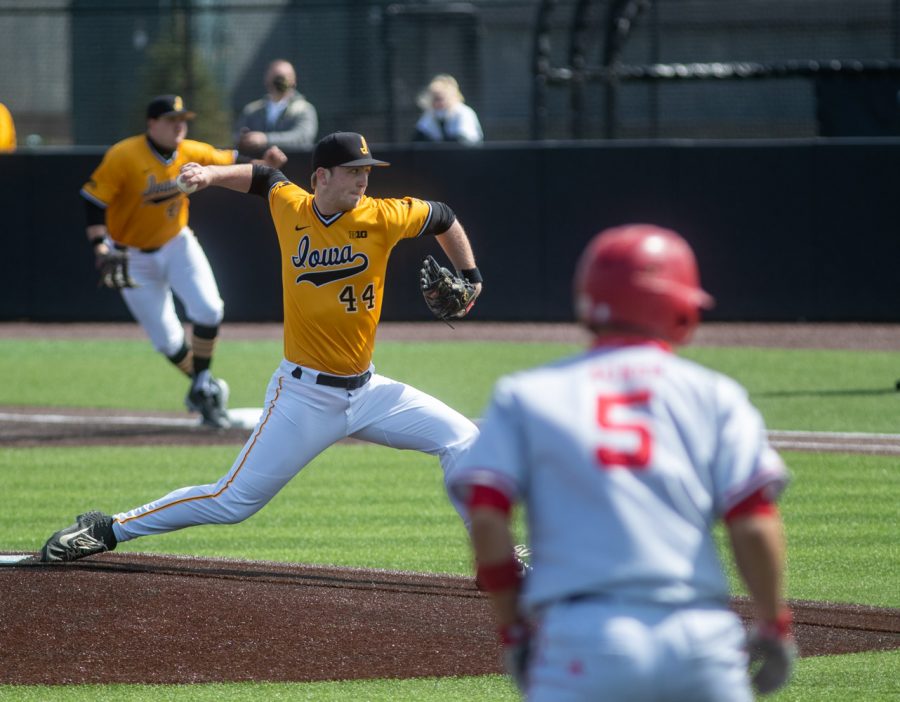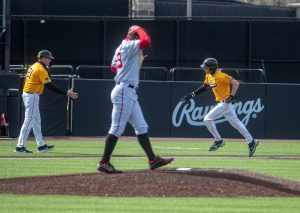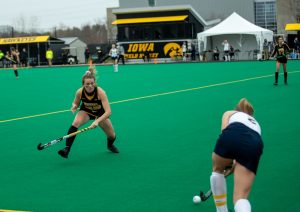Wild pitching dooms Iowa baseball in series finale against Nebraska
Hawkeye pitchers combined to issue eight walks against the Cornhuskers Sunday afternoon.
Iowa Pitcher Duncan Davitt throws a pitch during a baseball game between Iowa and Nebraska at Duane Banks Field on Sunday, March 21, 2021. Davitt went an inning and two-thirds, giving up five earned runs.The Cornhuskers defeated the Hawkeyes 13-8.
March 21, 2021
Iowa baseball’s starting pitcher Duncan Davitt walked Nebraska’s leadoff hitter Joe Acker on four pitches to begin Sunday afternoon’s contest between Hawkeyes and Cornhuskers at Duane Banks Field.
Then the sophomore from Indianola, Iowa, issued another free pass to Jaxon Hallmark.
Nebraska had two-runners on base and was already threatening to score before any of its hitters had put a ball in fair territory.
Iowa would surrender one run in the top of the first after back to back fly outs to center field that allowed Acker to advance to third and then score, and although the Hawkeyes would get three runs in the bottom of the frame and take a two-run lead into the second, the wild pitching continued.
In all, the Hawkeyes gave up 13 runs on 11 hits and gave the Cornhuskers eight walks in a 13-8 loss.
Nebraska sent five or more players up to bat in five of the nine innings.
Iowa’s pitchers — first Davitt, then redshirt freshman Jacob Henderson, and freshman Will Semb — walked multiple batters in the first, second, and sixth innings. Nebraska combined to score 10 runs in those innings.
“We didn’t pitch very well today,” head coach Rick Heller said. “That’s the story. We put too many guys on base. We fell behind in the count. We had to come in and they made us pay.”
RELATED: Comeback effort falls short as Nebraska takes game two over Iowa baseball
The Cornhuskers capitalized on the Hawkeyes poor control and resulting need to put pitches over the plate. Four of Nebraska’s six RBI base hits came on either full counts or when the Cornhusker hitter was ahead in the count.
Nebraska also scored runs on a poor pickoff throw and a balk.
Except for the ninth inning, after every run-scoring inning for the Hawkeyes, the Cornhuskers came back and pushed across runs to answer.
“It just seemed like we were timid [on the mound],” Heller said. “We didn’t carry ourselves very well and we didn’t look very confident. That was the thing that concerned me the most. We never talk about ‘you have to do this or that,’ we just talk about being confident, controlling yourself, and attacking the hitter, and really compete. That was the discerning thing today, was that we just didn’t do any of those things. I have no idea why. I don’t have an answer for it.”
On the day, Iowa used eight different arms, and four pitchers were charged with earned runs. Davitt took the loss which evened his record to 1-1 on the season. The five runs Davitt allowed in his 1.2 innings of work ballooned his season ERA to 8.18.
Although Nebraska’s pitching staff, like Iowa’s, allowed eight walks on the day, the Cornhuskers, helped by multiple tough plays made by their defenders were able to get out of jams without any huge innings. The three runs scored in the first inning would be the most Iowa would score in a single inning on Sunday.
Nebraska, meanwhile, plated six runs in the second and three in the sixth.
Iowa won’t see its home field again until April, instead traveling to Columbus, Ohio, and West Lafayette, Indiana, the next two weekends.






